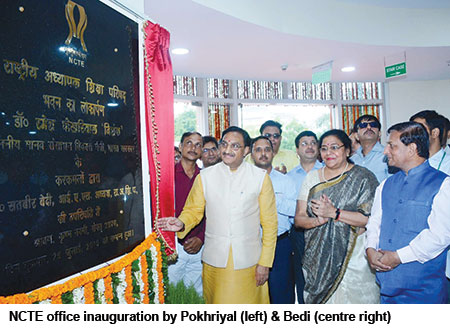 Even as the draft national Education Policy (NEP) 2019 report submitted to Union human resource development (HRD) minister Dr. Ramesh Pokhriyal ‘Nishank’ on May 31, and the reportedly over 150,000 suggestions made by the public (including EducationWorld), are being closely studied by HRD ministry officials in Shastri Bhavan, Delhi, the indications are that training and developing the skills of the country’s estimated 9 million government school teachers is likely to be a high priority of the BJP/NDA 2.0 alliance which swept General Election 2019 in May.
Even as the draft national Education Policy (NEP) 2019 report submitted to Union human resource development (HRD) minister Dr. Ramesh Pokhriyal ‘Nishank’ on May 31, and the reportedly over 150,000 suggestions made by the public (including EducationWorld), are being closely studied by HRD ministry officials in Shastri Bhavan, Delhi, the indications are that training and developing the skills of the country’s estimated 9 million government school teachers is likely to be a high priority of the BJP/NDA 2.0 alliance which swept General Election 2019 in May.
Evidence of the new government’s intention to upgrade the quality of teachers — especially of unionised government school teachers who despite being relatively well-paid (compared to the majority of their private school counterparts) have acquired a globally notorious reputation for absenteeism and fudged their qualifications — was provided on July 26. Dr. Pokhriyal, a respected Hindi litterateur and writer and former teacher, inaugurated the spanking new four-storey office of the National Council of Teacher Education (NCTE, estd.1995) constructed at a cost of Rs.38 crore in Dwarka, Delhi.
“We seek to reimagine NCTE’s role as the premier government agency for ensuring world-class teacher education in the country. NCTE is in the process of reinventing itself so that it lives up to the dreams and aspirations (of the nation) for which it was established 25 years ago,” said Pokhriyal speaking on the occasion.
The inauguration of the new exclusive building for NCTE, which thus far has been functioning out of the relatively cramped Hans Bhavan complex in Delhi, will enable the former to consolidate its all-India operations. “The inauguration of our newly constructed building at Dwarka paves the way for placing all the regional committees and offices of the NCTE under one roof. This will facilitate better coordination and streamlining of existing teaching resources. In addition, the adoption of e-governance at NCTE, especially converting all records into e-format and e-office, will facilitate seamless transition from a paper-based to a paperless office which will issue reliable e-certificates to duly qualified teachers countrywide,” said Dr. Satbir Bedi, joint secretary in the HRD ministry and former member-secretary of the National Commission for Women and the new chairperson of NCTE.
Established in 1973 as an advisory body to counsel the Central and state governments on improving teacher education, NCTE was granted autonomous status in 1995 under special legislation enacted by Parliament. However with government expenditure in public education restricted to a mere 3-3.5 percent of GDP (cf. the global average of 5 percent), 98 percent of the country’s 18,500 teacher training colleges have mushroomed in the private sector, the great majority of them dispensing obsolete teacher development education of indifferent quality. While a handful of upscale private teacher training colleges providing contemporary tech-intensive teacher education have mushroomed in recent years, the great majority of the country’s teacher training colleges are dispensing oudated education based upon a curriculum last revised by NCTE in 1996.
Unsurprisingly, the Kasturirangan Committee’s draft NEP 2019 report is highly critical of the status of teacher education in the country. “Heartbreakingly, the teacher education sector has been beleaguered with mediocrity as well as rampant corruption due to commercialisation. Most institutions today providing teacher education are small colleges in the private sector which offer only a narrow programme and where there is lack of commitment to the need for rigour and quality in teacher preparation. According to the Justice Verma Commission (2012), a majority of these standalone teaching institutes — over 10,000 in number — are not even attempting serious education, but are essentially selling degrees for a price,” says the committee’s report. As a solution, the draft NEP report inter alia suggests closure of substandard teacher education institutions, introduction of a revised four-year B.Ed programme to be delivered by full-fledged multidisciplinary universities with education departments, and establishing connections between HEIs (higher education institutions) and school clusters/complexes proposed by the committee.
According to Dr. Bedi, chairperson of NCTE, the council is working on a plan to establish a B.Ed college in every district. “We are hoping to establish 700 such colleges in the country by 2022 which will add 70,000 trained teachers per annum to augment our pool,” she says.
With the Kasturirangan Committee’s recommendations having struck a resonant chord within bona fide academics in the national capital, the auguries are good that teacher training and development — the Achilles heel of India’s failed K-12 education system — is set to be overhauled, even if belatedly.
Autar Nehru (Delhi)



























